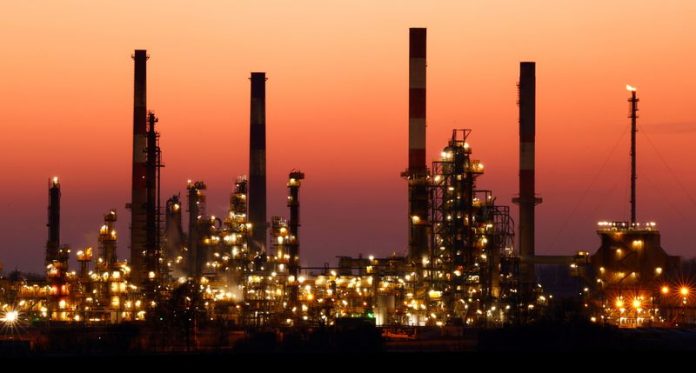(Reuters) -Crude oil prices fell on Monday on expectations of increasing supply, while the recent surge in energy costs and rising COVID-19 cases are expected to weigh on demand.
Brent crude futures fell 87 cents , or 1.1%, to $81.30 a barrel, as of 11 a.m. EDT (1500 GMT). U.S. West Texas Intermediate (WTI) crude lost 80 cents, or 1.0%, to $79.99 a barrel.
Oil markets have ended each of the last three weeks lower than the previous one. However, Brent has only shed a total of 4% in that time, as the market see-sawed between concerns about insufficient supply and worries that high prices will cool demand just as drillers ramp up activity.
The strengthening dollar has also pressured oil prices, along with speculation that President Joe Biden’s administration might release oil from the U.S. Strategic Petroleum Reserve.
U.S. energy firms last week added oil and natural gas rigs for a third week in a row with crude prices hovering near a seven-year high, prompting some drillers to return to the wellpad.
The oil and gas rig count, an early indicator of future output, rose by six to 556 in the week to Nov. 12, highest since April 2020, energy services firm Baker Hughes Co said on Friday.
U.S. shale production in December is expected to reach prepandemic levels of 8.68 million barrels a day, according to Rystad Energy.
At the same time, there are indications that demand may be slowing in due to heightened coronavirus cases and inflation.
The Organization of the Petroleum Exporting Countries (OPEC) last week cut its world oil demand forecast for the fourth quarter by 330,000 barrels per day (bpd) from last month’s forecast, as high energy prices hampered an economic recovery from the COVID-19 pandemic.
“The market now seems to be less concerned about the current supply tightness, expecting it to be short-lived,” said Rystad senior markets analyst Louise Dickson. “Traders are instead refocusing on the return of two bearish factors – the possibility of more oil supply sources and more Covid-19 cases.”
UAE Energy Minister Suhail al-Mazrouei said all indications point to an oil supply surplus in the first quarter of 2022.
“There’s little chance of OPEC+ raising output faster, especially if – as UAE energy minister Suhail al-Mazrouei claimed today – the group expects the market to return to surplus in the first quarter of 2022,” said Craig Erlam, senior markets analyst at OANDA.
Europe has again become the epicentre of the COVID-19 pandemic, prompting some governments to consider re-imposing lockdowns, while China is battling the spread of its biggest outbreak caused by the Delta variant.




